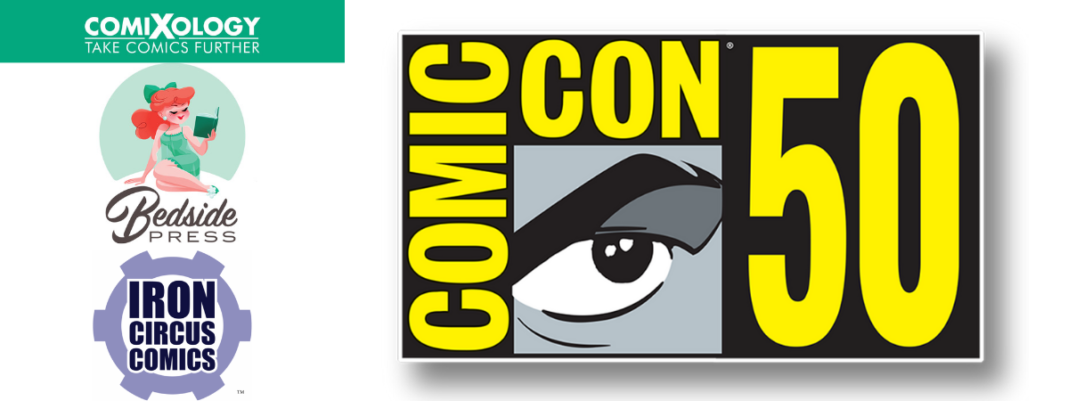By Hannibal Tabu
With great humor and candor, powerful names in independent comics talked about how they spread the word on their various projects at the “Comics PR & Marketing 101” panel. Moments before the panel was scheduled to begin, ComiXology head of PR Chip Mosher dramatically mounted the stage using the wheelchair access riser, explaining that he had bolts in his foot and really bad arthritis. He then cheerfully announced that this was the 10th anniversary of the panel (“I’ve been at all ten!”), but sadly noted that writer Alex Segura and PR coordinator Ivan Salazar were unable to attend.
However, the panel did include C. Spike Trotman of Iron Circus Comics, Hope Nicholson from Bedside Press, and Eisner nominee Kel McDonald (The Stone King).
“Let’s pour one out for the homies who can’t be here,” Mosher said, mocking pouring libations off the stage.
“Somebody has to clean that up!” Trotman protested.
Mosher was wearing a jacket that said “Lucifer” in rainbow colors, which led to a lengthy discussion of a 1972 film called Lucifer Rising which inspired the jacket. Then there was a discussion of a new trailer for the movie musical Cats, which was roundly criticized.
Mosher did a lengthy prelude about the numerous titles that ComiXology and Amazon offer. As he noticed the edge of the screen was cutting off the edge of his presentation, an audience member adjusted the projector. Mosher cheered this as a victory for teamwork.
Mosher asked the crowd what they wanted to do, first looking at writers and artists. When he asked, some talked about businesses they wanted to start, communities they represent as reasons for wanting a non-writing or -drawing role in comics.
Mosher offered only one question for the panel: What’s the one piece of advice that they would give?
Nicholson said, “No one’s gonna promote as much as you. Learn from other industries and other jurisdictions, don’t neglect self publishers and webcomics. You can take elements and merge them into something that works for your own personality. People think there’s one path to success, but it’s a maze, you have to find your own way through.”
Trotman agreed, offering, “No one’s gonna care as much as you. I wish we lived in a meritocracy,” but suggested that the cold realities of business were unavoidable. Her philosophy towards publishing is work that’s “strange and amazing,” marketing to people who don’t get marketed to, in genres that don’t get marketed. She suggested that trying to mirror the companies in the market was not a success strategy, that the circumstances that made IDW and Marvel don’t exist anymore. “Those spots are taken,” she said.
McDonald said, “You need to be confident and able to clearly articulate what your book is about.”
Trotman talked about finding a niche when she started with her book Smut Peddler, a book with what could be considered prurient pictures drawn by people who don’t normally do that. McDonald jokingly said, “look at all the children in the audience!”
Following her idea of copying whatever Trotman did, McDonald said she saw a vacuum for merchandise for children, who were often standing around when she explained her work. Now she has merchandise children can enjoy alongside her more adult fare.
Mosher opened up for crowd questions, led off by a creator that Trotman and McDonald knew, asking them to tell her something she didn’t know. McDonald asked if the woman read Read Why We Buy? “I did,” she replied.
Trotman talked about a 2021 library round table group assembling a “go-to” list of graphic novels that libraries should use as their foundation for offerings. “If you get on that list,” Trotman insisted, “you will sell 50,000 books,” noting that “most publishers live off of two or three titles.” The questioner said she had the email address of the group’s president. They ended up unable to offer her anything new, but the audience was grateful for the information.
The second question was about how to contact comic shops to get them to pre-order. McDonald suggested having an artist design a postcard, include the order number and relevant dates, write a handwritten note and send that.
Mosher recommended looking at listings on comicspro.org, which includes “stores motivated enough to be part of a trade association.” He emphasized, “do not call them on Tuesday, do not call them on Wednesday,” and recommended a canned email to follow up any contact and sending complete digital copies for their review.
An audience member asked if marketing starts when the project is complete. “The book sits finished for eight months before we release it,” Trotman said. While recommending a long turnaround period to take time to build interest in the work, “not every comics company does that.” She also said that for self publishers, “every day you’re uploading an image. Stay visible, it’s about introducing new work to people who haven’t seen it.” She said that only three to seven percent of the people who read work for free will ever pay for it.
McDonald filled out tip sheets for book reviews, and noted that the ones for reviews coming out next summer are due before SDCC this year. She suggested that marketing directly to fans can come closer to the release date.
The next question was about whether it was better to debut with a passion project or consider something more market friendly. Nicholson said, “Do something small, finish it, get it out there.” Trotman said starting her magnum opus was a “huge mistake,” while McDonald and Nicholson admitted that they hadn’t finished theirs.
Mosher got word from convention organizers that time was running out and that the rest of the questions would have to be speed round. The first was about promotion strategies, and Trotman said she likes to do long, strange Twitter threads, like one she did about Lizzie Borden, then after it gets to 2,000 retweets, she adds a link to her kickstarter. McDonald schedules a tweet every three hours during her Kickstarter campaigns because people who see it in the morning aren’t the same people who will see it in the afternoon.
What about hiring someone to help with marketing? Trotman said it takes research and a vendor with a plan of action. “Be worried about who’s looking at you.” Nicholson suggested, “Find someone who understands the market, understands press and has a proven track record.” She also suggested finding vendors who don’t rely on the same three outlets, but have a multiplicity of options.
The final question was about email lists. Trotman said hers succeeded because it was only opt-in, she never added random email addresses. McDonald said there was a link at the top of her website for it and in her pinned tweet. Nicholson said 80% of her funders came from the mailing list, and that she was always giving them free stuff to keep them engaged.
Mosher asked what was the best question asked, and after the panel agreed that the stumper one at first was best, the questioner received a brand new Kindle 7 before Mosher had to run off to host the CBLDF fundraiser.









Comments are closed.